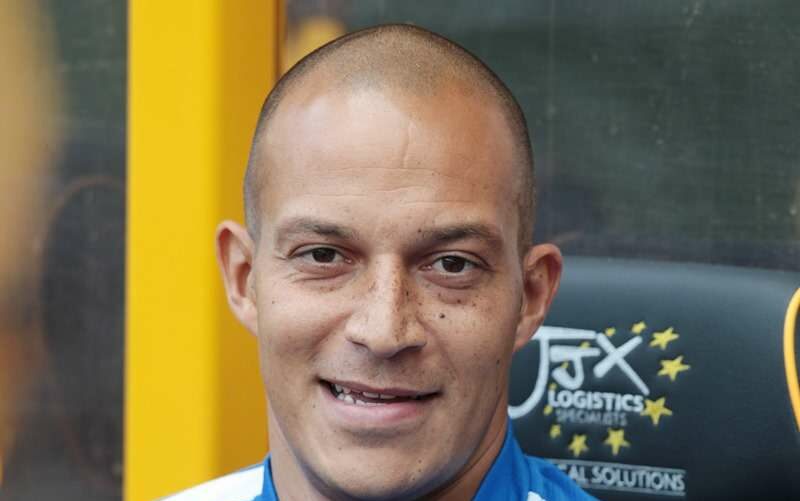by Chris Dunlavy
BOBBY Zamora was just 19 years old when Micky Adams, his manager at Brighton, likened the striker to an England legend.
“No disrespect to Alan Shearer,” said the former Leicester boss, who led the Seagulls to the Third Division title in 2001. “But Bobby is a more clinical finisher at that age than Alan was.”
Talk about setting the bar high. Yet if history tells us that Zamora would ultimately fall short of those lofty standards, few at the time considered Adams deluded.
Loaned from Bristol Rovers at the fag-end of the 1999-00 campaign, Zamora scored six goals in six games to seize the affection of the Withdean and a permanent £100,000 switch.
What followed over the next three years has gone down in Brighton folklore; 83 goals in 136 games, two golden boots, a brace of promotions, a place in both the Third and Second Division teams of the season.
“He was so far ahead of that level, it was untrue,” recalls FLP columnist and ex-Seagulls teammate Adam Virgo. “His strength, his pace, his work-rate – I’ve never seen anyone cover so much ground and do it so effectively.
“I’ve known a lot of players who put themselves about but never put the ball in the net. Bobby did that and scored goals by the hatful. He’s easily the best player I’ve ever worked with.”
Brighton fans loved him so much they even recorded a terrace chant – That’s Zamora, to the tune of Dean Martin’s That’s Amore – and released it as a single. Little wonder his return in August, 12 years after leaving to join Spurs for £1.5m, stirred such emotion.
“Ask any Brighton fan for their favourite player and they’ll all say Bobby,” said Darren Freeman, another Withdean contemporary. “He’s a hero there, and rightly so. Coming back gave everyone such a lift.”
Judged by his explosive emergence, the intervening years were rather sedate. That move to Spurs was hamstrung by the form of Robbie Keane and the departure of boss Glenn Hoddle, who always regretted not getting time to develop his young signing.
Spells at West Ham and Fulham – where he earned two England caps – were more fruitful, if not prolific. Yet if the standard of opposition precluded the goalscoring feats of his Withdean days, it was offset by Zamora’s development into an all-round centre-forward.
As a youngster on Wanstead Flats in East London, where he played for the famous Senrab side featuring John Terry and Ledley King, then as a youth player at West Ham, Zamora was slightly built and swift, a pure goalscorer. He idolised Tony Cottee.
Later, as he filled out, slowed down and wised up, his game became more physical, measured and cerebral. The result was a crafty player deeply valued by both managers and team-mates.
“What impressed me about Bobby in training was the way he thought about improving his game,” said Peter Taylor, who succeeded Adams at Brighton. “Whenever we did a finishing practice he would never use his stronger left foot, always his right. That really brought it home to me. He was always looking to get better.”
Alan Pardew admitted that West Ham couldn’t have won promotion to the Premier League in 2006 without Zamora’s influence. Later, Fulham boss Roy Hodgson recommended him to England predecessor Fabio Capello.
Mark Hughes, Zamora’s manager at Fulham, admitted the striker’s quality had surprised him. “You walk into a club and sometimes you don’t know what you’re getting,” he said. “But Bobby is a top-class Premier League striker. His link-up play and teamwork has impressed me and is far better than people give him credit for. He is the complete package.”
Andy Johnson, a team-mate at Craven Cottage, credited Zamora with making him look a better player, Charlie Austin with aiding his stunning 18-goal Premier League debut.
“Bobby is a great person and a fantastic team-mate,” said the QPR striker. “Playing alongside him is brilliant because he creates so many chances for me. I wouldn’t have got so many goals without him.”
Perhaps Zamora’s only real weakness was self-belief, a characteristic touched on by both Pardew and Hodgson.
“Bobby is a fantastic technician and a great character to have in your team,” said Pardew. “The problem will be in his mind. When he plays with confidence he was always as good as anybody else out there. When he doesn’t, he can struggle. Psychology is a big part of Bobby’s game.”
Hodgson, meanwhile, urged Zamora to stay off fans’ forums after taking the criticism of the keyboard warriors to heart.
These days Zamora has few worries. He’s back at his spiritual home, back amongst the goals.
“Having Bobby back was a no-brainer,” said Seagulls boss Chris Hughton. “His experience, his knowledge, what he could give us in the changing room. How players could learn from him. What he meant symbolically for the club. And above all, his quality. That has never changed.”
















